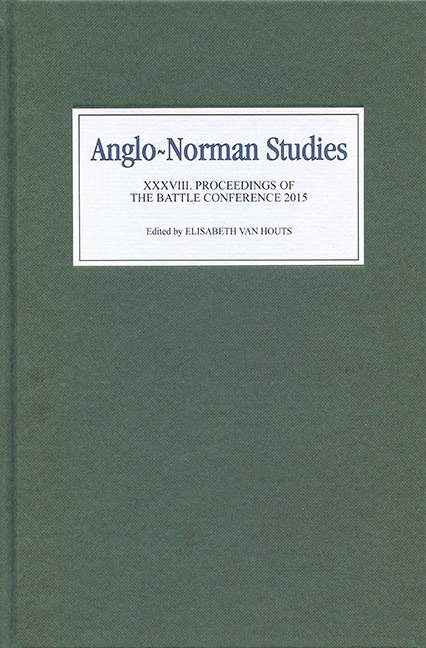Book contents
- Frontmatter
- Contents
- Illustrations and Tables
- Editor's Preface
- Abbreviations
- From the Articles of the Barons to Magna Carta (The R. Allen Brown Memorial Lecture, 2015)
- Jews in the Glosses of a Late Twelfth-Century Anglo-Norman Gratian Manuscript (Cambridge, Gonville and Caius College, MS 283/676)
- Monastic Autonomy, Episcopal Authority and the Norman Conquest: The Records of Barking Abbey (The Marjorie Chibnall Memorial Essay, 2015)
- Economy Distorted, Economy Restored: Order, Economy and Salvation in Anglo-Norman Monastic Writing
- Monastic Patronage and Family Disputes in Eleventh- and Early Twelfth-Century Normandy
- Constance, Princess of Antioch (1130–1164): Ancestry, Marriages and Family
- Early Aristocratic Seals: An Anglo-Norman Success Story
- English Towns and Urban Society after the Norman Conquest
- Wreck of the Sea in Law and Practice in Eleventh- and Twelfth-Century England
- Social Life and Religious Culture in Twelfth-Century Norwich and Norfolk
- Bad Crusaders? The Normans of Southern Italy and the Crusading Movement in the Twelfth Century
- Turold, Wadard and Vitalis: Why Are They on the Bayeux Tapestry?
English Towns and Urban Society after the Norman Conquest
Published online by Cambridge University Press: 12 September 2017
- Frontmatter
- Contents
- Illustrations and Tables
- Editor's Preface
- Abbreviations
- From the Articles of the Barons to Magna Carta (The R. Allen Brown Memorial Lecture, 2015)
- Jews in the Glosses of a Late Twelfth-Century Anglo-Norman Gratian Manuscript (Cambridge, Gonville and Caius College, MS 283/676)
- Monastic Autonomy, Episcopal Authority and the Norman Conquest: The Records of Barking Abbey (The Marjorie Chibnall Memorial Essay, 2015)
- Economy Distorted, Economy Restored: Order, Economy and Salvation in Anglo-Norman Monastic Writing
- Monastic Patronage and Family Disputes in Eleventh- and Early Twelfth-Century Normandy
- Constance, Princess of Antioch (1130–1164): Ancestry, Marriages and Family
- Early Aristocratic Seals: An Anglo-Norman Success Story
- English Towns and Urban Society after the Norman Conquest
- Wreck of the Sea in Law and Practice in Eleventh- and Twelfth-Century England
- Social Life and Religious Culture in Twelfth-Century Norwich and Norfolk
- Bad Crusaders? The Normans of Southern Italy and the Crusading Movement in the Twelfth Century
- Turold, Wadard and Vitalis: Why Are They on the Bayeux Tapestry?
Summary
The more attention is paid to ethnic interaction and assimilation in post-Conquest England, the more we are beginning to understand the importance of towns and townspeople within this process.
Indeed, that urban societies may have been particularly precocious in this regard is suggested by both William of Malmesbury and Orderic Vitalis, who note that the English and the Normans were living together peacefully in towns and even intermarrying as early as the 1070s. It is however problematic merely to take these comments as read. Both men were themselves of mixed Anglo-Norman or Anglo- French parentage, with Orderic's view perhaps being further coloured by having drawn on the lost ending to the Gesta Guillelmi. Moreover, as to their assessment of exogamous marriages, while these were doubtless crucial to the assimilation process in the long term, it seems on weighing the evidence that they may in fact have been less common during the late eleventh century than previously assumed. In what follows, the focus will therefore be primarily on the experiences of towns and their societies between 1066 and 1075, the aim being to examine how their social environments were shaped by this period, and to consider whether the resultant climate may have been conducive to the kind of harmonious cohabitation described by William and Orderic.
Such a discussion is obviously tied up with the fairly well-worn narrative of the earliest period after Hastings. However, it is hoped that by approaching this narrative with towns and urban communities in mind we might begin to see parts of it in at least a somewhat altered – if not necessarily new – light. If nothing else, it should first serve to emphasize the significance of towns within the conquest process of the late 1060s and early 1070s. It is certainly no coincidence that surviving accounts are conspicuously littered with mentions of towns; the Conqueror evidently made a concerted effort to gain the submission of important towns both before and after his coronation, with a number of these playing host to events pivotal within his campaigns to secure the throne and subjugate the kingdom. This point may well be obvious, but it is one that tends to be pushed into the background of the wider narrative. Moreover, what follows ought to highlight the fact that the Conqueror's strategy for subjugating the kingdom was modified as new challenges arose and circumstances changed.
- Type
- Chapter
- Information
- Anglo-Norman Studies XXXVIIIProceedings of the Battle Conference 2015, pp. 125 - 140Publisher: Boydell & BrewerPrint publication year: 2016



